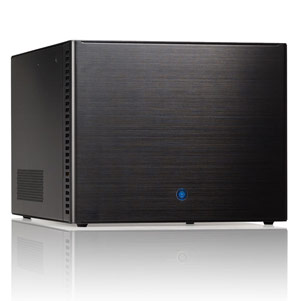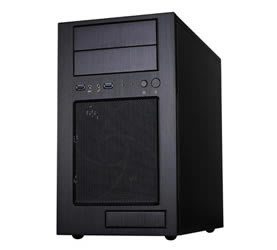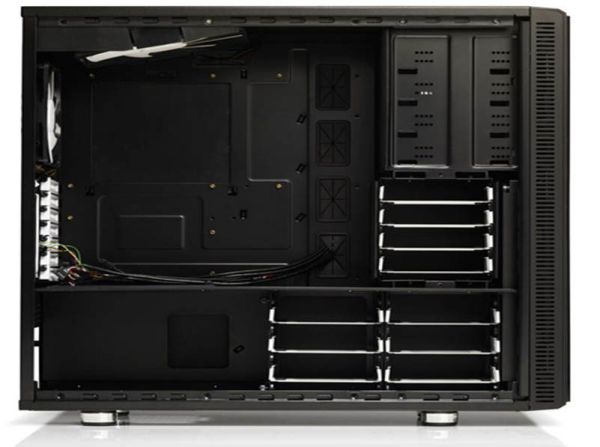File Server Builder's Guide
by Zach Throckmorton on September 4, 2011 3:30 PM ESTAs motherboard layout is important in ensuring that airflow is as unobstructed as possible, case design is also critical in facilitating excellent airflow. If you're building a system with one or two hard drives, most cases work fine for a home file server - just make sure there is a fan near the hard drive(s) so it is not sitting in stagnant air. However, if your server requires multiple disks, here are a few cases that work especially well for file servers.
Mini-ITX

Fractal's Array R2 is a nearly perfect home file server case. At less than 14" deep by 10" wide by 8" tall, it occupies little volume. It positions a removable hard drive cage immediately behind a quiet yet powerful 140mm intake fan. The hard drive cage accommodates up to six hard drives using vibration-dampening silicone mounts, and there is also room for a 2.5" drive (either an SSD or HDD). According to my testing, when stuffed with six low-rpm 2TB mass storage HDDs and one SSD (with an Intel Pentium G620 CPU installed), the temperatures of the HDDs hover around 40C even when all drives are under artificial sustained load (using Iometer). The PSU is a custom SFX form factor model, 80+ efficiency 300W unit with ample amps on the split 12V rail to power six HDDs. The PSU features seven SATA connectors and one legacy molex connector, so there are no extraneous molex plugs and enough SATA plugs. Furthermore, the cables are shorter than typical, so excessive cabling does not interfere with airflow. The case itself is constructed of aluminum so it is lightweight, and its overall build quality is very high. It does not have room for an optical drive, but I consider optical drives superfluous for a home file server. If necessary, you can always hook up a USB interface external optical drive. The only drawback of this case and its PSU is the price: at just under $200, it is not cheap. However, the subjective aesthetics, objective functionality of the case and the custom PSU are worth the cost if you want a small but capacious home file server case.
Micro-ATX

As I prefer home file servers that take up as little space as possible, Silverstone's TJ08B-E is a great, smaller micro-ATX minitower. It's less than 16" deep, 9" wide, 15" tall and weighs less than 12 pounds. It can accommodate up to five HDDs plus one SSD. As with the Fractal Array R2, the hard drives are placed immediately behind a front intake fan - though in this case, it's an even larger 180mm unit. The TJ08B-E is flexible in that it can hold a couple optical drives as well as a GPU in case you want to repurpose or multipurpose it. When stuffed with four low-rpm green drives, the temperatures under load don't exceed 45C during sustained transfers. Overall build quality is very good, like most Silverstone cases.
Silverstone makes a diminutive, fully modular PSU that makes working with smaller cases like the TJ08B-E, Lian Li PC-Q08, and others much easier. Silverstone also offers a short cable kit, making the ST50F-P PSU even better suited to SFF cases. Finally, it's clear that Silverstone had smaller multi-HDD systems in mind when designing the CP06 SATA power plug extension cable. This extender connects to a single SATA power plug and then has four SATA power plugs that are spaced closer than usual together, further reducing cable clutter. Though the cost of these accessories adds up, they make an ideal cabling solution very easy to implement. Regardless of whatever PSU you decide to go with, if you use a split 12V rail model, make sure you don't load up one rail with HDDs. If you go with a single 12V rail model, you'll want that rail to be beefy - for example, don't try to put ten HDDs and four case fans on a budget PSU with a 20A 12V rail.
Full Tower
Very few cases can accommodate ten HDDs at stock (without adding adapters), and such cases are not at all small. Full towers also typically offer excellent airflow, and cable management is not very difficult. Fractal's Define XL is one of the least expensive 10 HDD bay full tower cases available. It is well-built, and extra care has been paid to making the case quiet in the form of panel insulation. It is impossible to hear active HDDs inside this case even when you're sitting just a few feet from it (even the notoriously loud VelociRaptors). Further, there are plenty of integrated niceties like adjustable/flexible cable baffles that assist in cable management. Seven of the ten HDD slots are immediately behind fans, with three slots one cage removed from the front intake fans. Even still, the HDDs that aren't right behind the fans stay cool (between 35C and 40C). At around $150, it is an excellent value. Just make sure you don't pair it up with Silverstone's short cable kit!
We've saved the most important aspect of a home file server - the hard drives - for the next and last component page.











152 Comments
View All Comments
Rick83 - Monday, September 5, 2011 - link
I guess it's not open source, and the free version has little in the way of support, as well as little deployment, compared to the standard RAID implementations.I'd stick with something proven and stable, especially if I trust it with storing all my data.
3DoubleD - Tuesday, September 6, 2011 - link
While it is not 100% open source, I would say the meaningful bulk of it is. Unraid is based on a stripped down version of Slackware. Moreover, the abundance of plugin's, are developed by the community and completely free. When compared to WHS, there is really no comparison.In terms of support for the free version, I received ample support on the Unraid forums while testing out the free version. This included support from both expert users AND Limetech employees. Payment is not a requirement for browsing or posting on the forums.
Finally, you question the stability of the system without any justification. Do you justify this based on the size of the user base? In that case, the original WHS was REALLY stable... oh wait what was that about the file corruption problems?
I've been using Unraid for 2 years and I can attest not only to the stability of the software, but also to the hard work of the Limetech employees and enthusiastic user base. Nothing is released without being heavily tested.
Still, you should never rely on one system to protect all of your data, regardless of the software or hardware you are using. Unraid protects you against hard drive failure. You still need to make backups of critical data. I wouldn't trust any system with the only copy of my data.
arswihart - Sunday, September 4, 2011 - link
I think a survey of the best pre-configured NAS boxes from the likes of QNAP, Synology, and others, would be a nice follow-up to this great article.Hrel - Sunday, September 4, 2011 - link
Kind of surprised you didn't mention UPS or surge protection. Yes choose a good power supply. But plug that power supply into a UPS and since UPS's have inadequate surge protection plug that into a high quality surge protector. How good do you think it is for your hard drives to randomly shut down every time the power goes out?I personally use a small 60 dollar APC UPS plugged into a Belkin surge protector rated at about 4000 Joules. I have my computer and file server set up to power themselves down properly when being powered by UPS. That was there are never improper shut downs.
Finally, in my experience FreeNAS works fine on 1GB of RAM. (I've never tried less). Only reason I could think to have more than that is if you're streaming HD video.
JohanAnandtech - Monday, September 5, 2011 - link
"Only reason I could think to have more than that is if you're streaming HD video. "Filesystem caching does wonders for the performance of a fileserver. I would definitely use 4 GB.
tiro_uspsss - Monday, September 5, 2011 - link
Why wasn't ECC RAM mentioned?Please don't give the excuse 'its too expensive' - it isn't - suck it up.
Given that the file server stays on 24/7(?) & is holding data, ECC is a no-brainer!
Oh & for anyone interested I know a way to get 4 cores, 2GB ECC+REG RAM, 2x GbE Intel server mobo for ~USD$60 & it'll take ~100W from the wall socket @ load. Only downside to this rig config is: 32-bit only, E-ATX mobo & only 2 expansion slots (PCIEx8 & PCI-X). PCIEx8 is enough for a RAID card tho. Mobo has 6 SATA ports.
imaheadcase - Monday, September 5, 2011 - link
ECC is not needed is why. Servers don't need error correction since its just for storage and not actually doing work.HMTK - Monday, September 5, 2011 - link
For something that runs 24/7 you DO consider ECC. Just in case something happens in memory and gets written to disk in a corrupt state.WillR - Monday, September 5, 2011 - link
Sorry, but the first half of page 3 about CPUs is poorly written."My preferred Atom home server motherboard/cpu combo is the ASUS AT5NM10T-I, a passively-cooled, Atom D525 "
Links to a deactivated product. And then it's obviously not preferred when you say
"it is difficult to recommend the Atom-based solution given Zacate's substantial performance advantage."
Even though AnandTech's own Bench charts for the two contradict this claim. http://www.anandtech.com/bench/Product/328?vs=110
The two are nearly identical performance wise. I'd personally reiterate the lack of hardware encryption and suggest more power for the user that likes having the future option of utilizing SW RAID with parity. Neither are quite powerful enough to handle that task while trying to saturate a gbit LAN.
I personally consider purchasing a copy of WHS to perform the function of a simple file server as absurd. For what purpose? To have your XBox 360 work with it out of the box?
To add to the absurdity, I'd suggest:
SUPERMICRO MBD-X9SCL+-F
6 SATA II ports, dual high quality NICs for some redundancy, and IPMI.
Intel Xeon E3-1220
as dual core Xeons are nearly extinct.
$15-40 worth of Kingston or Crucial ECC DDR3. 1 GB is plenty for a file server, but 4 is so cheap these days even with ECC that you might as well buy some OS level cache.
IMHO, if you're going to suggest parts for a server, suggest server parts even if it's for a home user/office. Also, IMHO, for anything less than what's needed by a rig such as this, the user would probably be well served by a NAS unit or even a router with support for sharing an external hard drive on the LAN and FTP to the world via the router's own firewall and port forwarding. Using the Atom or E-350 is quite possibly the overkill scenario for those just needing to share 1 drive between 2-4 PCs 24/7, yet underpowered when trying to accomplish high performance data transfers and data security. As a RAID 0/5 backup server they'd be adequate.
HMTK - Monday, September 5, 2011 - link
++